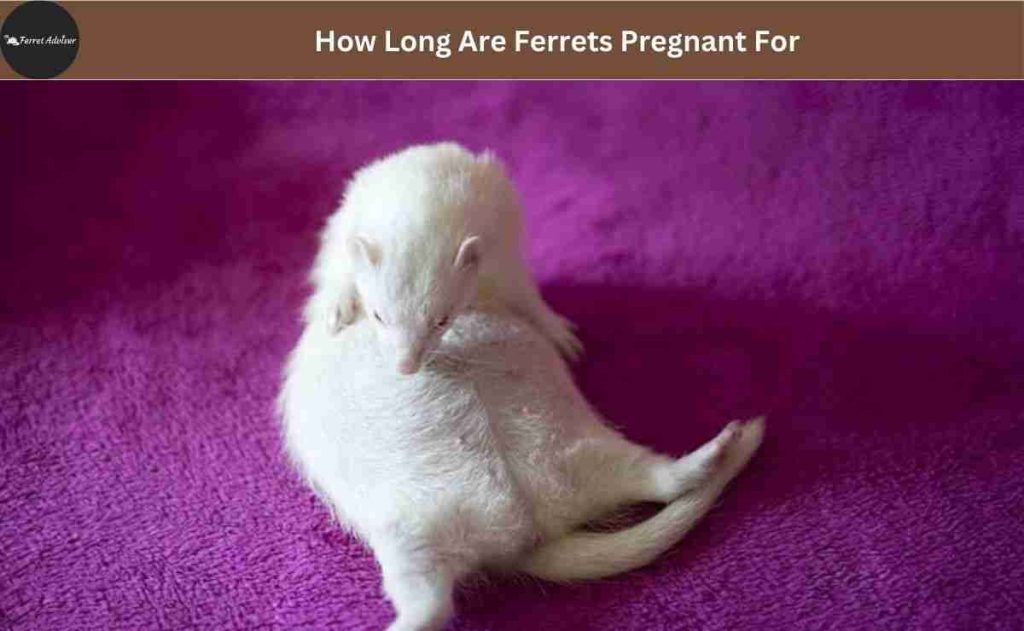If you are thinking of breeding ferrets, you should know the breeding process and how long are ferrets pregnant for.
Ferrets are small domesticated animals that have relatively short pregnancies compared to other animals. On average, a female ferret’s pregnancy lasts about 41 to 42 days, ranging from 37 to 43 days. However, the exact length of pregnancy can vary slightly among individual ferrets.
How Long Are Ferrets Pregnant For?

Breeding ferrets is not that simple. As owners, we are responsible for taking care of our pets’ behavioral and physical health problems during this time.
If you have a male and female ferret, you can increase the ferret population, but make sure they are not closely related to ferrets. As it could cause health problems in the babies like deafness and blindness.
After mating, the pregnancy duration of Jills (female ferrets) is about 37 to 42 days. During that time, Jills experience hormonal and physical changes in preparation for giving birth.
They go through a hard time and you should take care of them properly. Give them a comfortable and quiet environment during this time, as stress can negatively affect the pregnancy.
How can I tell if my ferret is pregnant?
There are several signs and symptoms to look out for that might indicate that your ferret is expecting little ones.
One of the most obvious signs of pregnancy in ferrets is a noticeable weight gain. Pregnant ferrets will often have a rounder belly and may appear to be larger than usual.
Though weight gain alone is not enough to confirm a pregnancy, ferrets can also gain weight due to other factors such as overeating or illness.
Pregnant ferrets may become more moody or irritable, and they may also show signs of nesting behavior. This can include shredding bedding or gathering soft materials to create a cozy space for their future offspring.
Look for physical changes in a pregnant ferret. Their nipples can also be an indication of pregnancy. As the pregnancy progresses, the nipples will become larger and may also change color. They might appear to be more pink or red than usual.
None of these signs exactly prove your ferret’s pregnancy. If you suspect that your ferret may be pregnant, it would be better to consult with a veterinarian for a definitive diagnosis.
They can perform a physical examination or recommend further tests, such as an ultrasound, to confirm the pregnancy.
The veterinarian can also provide important information on what signs to look out for to determine if Jill is having any complications during the pregnancy.
How To Care for Your Ferrets During Pregnancy?
Pregnant jills go through many health and mental complications during pregnancy. So in this time, you have to ensure the right care. Here are some tips you can follow:
- Give Her Privacy
During pregnancy, jills can show stress and irritation. So you need to create a calm and secure area for the pregnant ferret. It would be better if you separated your ferret’s cage. Make fresh and clean bedding and spread some shavings for comfort. Ferrets also use the shavings for nesting.
You need to put the cage in a warm and quiet place where she can stay comfortability. Make sure the habitat is free from stressors and other animals.
- A balanced diet
A proper and balanced diet is essential for the health of a pregnant ferret. She needs more energy when she will give birth. Feed them a high-quality ferret-specific diet that is rich in protein and fat. Give her a supplement to their diet with calcium and other essential vitamins.
- Regular veterinary check-ups
Regular visits to the veterinarian are crucial to monitor the health and progress of the pregnant ferret. The vet will provide guidance on any additional nutritional needs or specific care requirements during pregnancy.
- Exercise and stimulation
Though it is important to provide a calm and stress-free environment, it is equally important to encourage regular exercise and mental stimulation for the pregnant ferret. Give her playtime in observation and the use of interactive toys within their safe enclosure.
- Monitoring behavior and weight gain
Pregnant ferrets may show changes in behavior and weight gain as their pregnancy progresses. Observe any unusual behavior or significant weight fluctuations and consult a veterinarian if necessary.
On the contrary, jills with larger litter may lose weight. How much you feed her, she will lose weight. A larger litter has up to 10 kits that demand high calories and energy.
- Preparing for birth
As the due date approaches, you can prepare for the arrival of the kits. This includes providing appropriate nesting materials, such as clean and soft bedding, and ensuring a warm and quiet birthing area.
Consult a vet in case of any complications during the birthing process.
- Post-pregnancy care
After giving birth, the mother ferret requires additional care and nutritional support. You should monitor her closely and provide her with a high-quality diet to aid in milk production and post-pregnancy recovery.
- Taking care of the babies
Once Jill gives birth, give her and the newborn kits with appropriate care and nutrition. The kits are born hairless, blind, and deaf, so they rely completely on their mother for nourishment and protection.
After about three weeks, the kits will start to open their eyes and become more independent.
Factors Affecting Ferret Pregnancy
When it comes to ferret pregnancy, several factors can play a role in determining the outcome.
The age of the ferret is the first thing to consider. Older ferrets may have a higher risk of complications during pregnancy and may be more prone to issues such as stillbirths or difficulty delivering the kits.
So it’s generally recommended to breed ferrets between the ages of one and three years old, as they are typically in their prime reproductive years.
A healthy ferret is more likely to have a successful pregnancy and deliver healthy kits. This includes providing a balanced diet, regular veterinary check-ups, and keeping up with vaccinations and preventatives.
Genetics also plays a role in ferret pregnancies. Breeding two ferrets with good genetics can increase the chances of a successful pregnancy and healthy kits. You need to research and select breeding pairs carefully.
Frequently Asked Questions (FAQs)
How long do ferrets take to mate?
Ferrets typically reach sexual maturity between 4 to 8 months of age. Once mature, they can mate anytime throughout the year.
However, they are most receptive during the breeding season, which typically spans from late winter to early spring.
How many babies can ferrets have at a time?
Ferrets are prolific breeders, and a single female ferret can give birth to a large litter of kits. On average, a ferret litter has 4 to 8 kits, although larger litters of up to 12 kits are not uncommon.
At what age can baby ferrets leave their mother?
Baby ferrets, or kits, are blind, deaf, and entirely dependent on their mother for care and nourishment. They typically remain with their mother in the nest for around 6 to 8 weeks before they are ready to venture out on their own.
Final Words
The whole time of ferret’s pregnancy, you have to provide adequate care. You must know the duration of your ferret’s pregnancy.
So closely observe your ferret’s behavior and physical changes, and seek for professional advice. Knowing the time, you can properly care for your pregnant ferret and prepare for the exciting arrival of new additions to your furry family.
